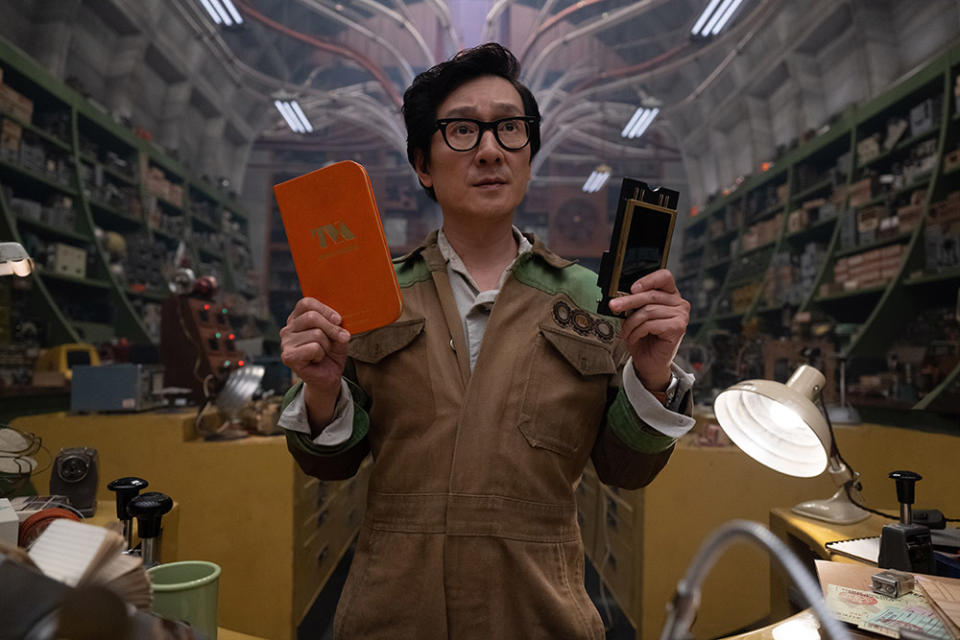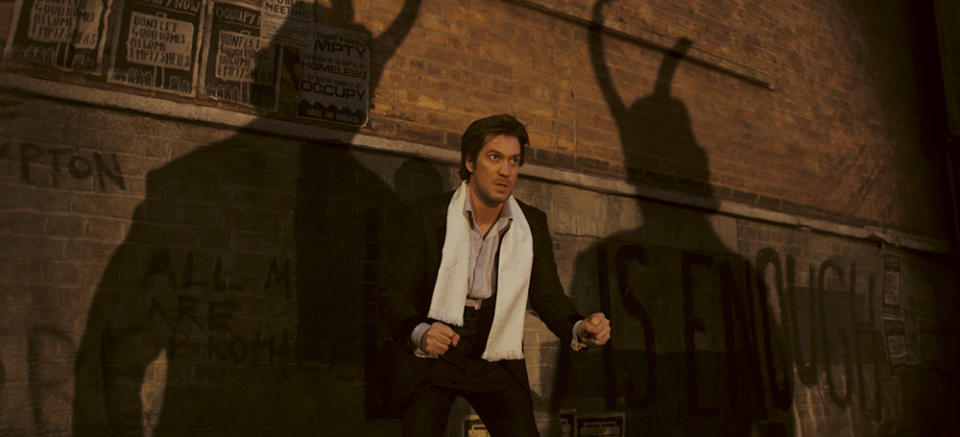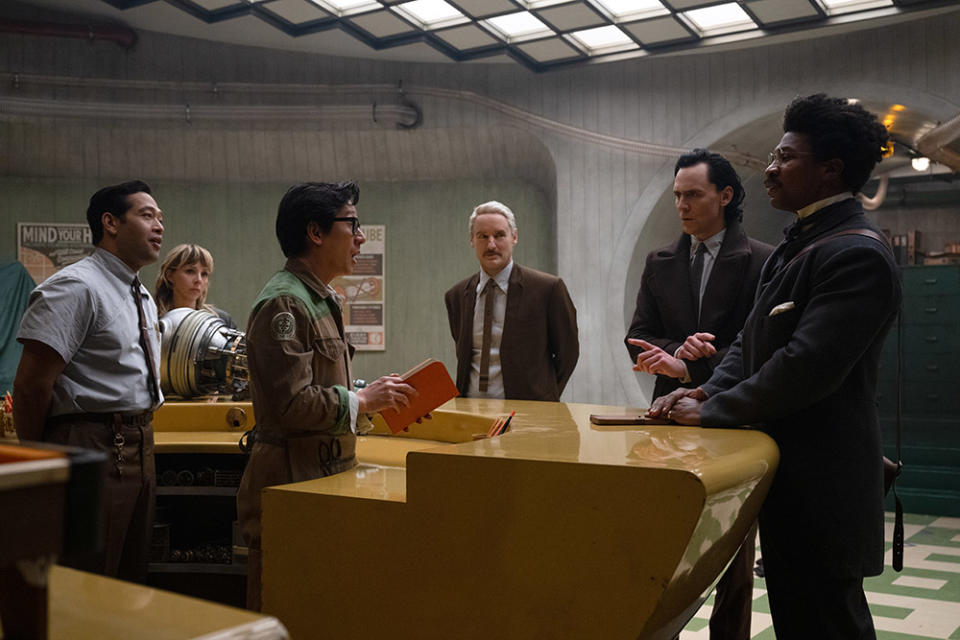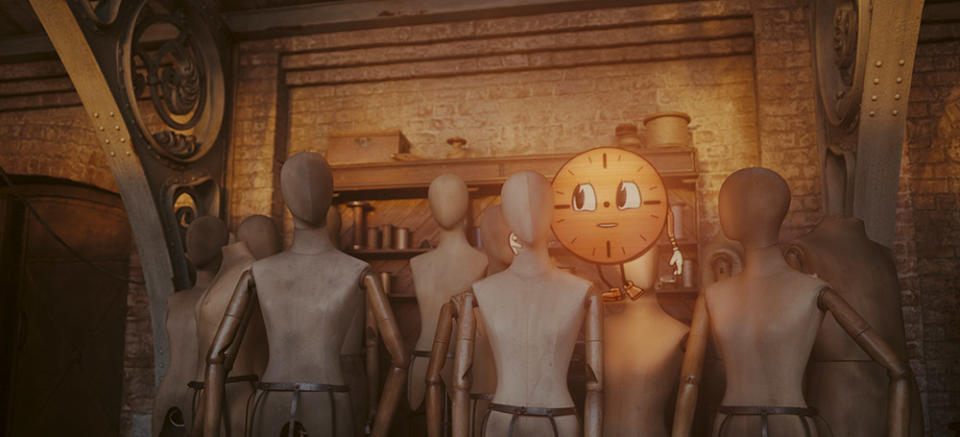‘Loki’ Head Writer Eric Martin Talks Episode Four’s Explosive Ending: “There’s Meaning in All of It”

[This story contains spoilers for Loki season two, episode four, “Heart of the TVA.”]
If Ke Huy Quan’s Ouroboros is the glue that holds the TVA together, then Loki season two head writer Eric Martin is the Ouroboros of the entire Loki enterprise.
More from The Hollywood Reporter
Martin’s journey began in grad school when he befriended future Loki creator, Michael Waldron. The duo first cut their teeth as production assistants on Rick and Morty and Community before reuniting a number of years later as full-fledged writers on Waldron’s stellar yet criminally underseen Starz wrestling drama, Heels. Once they wrapped up their responsibilities on Heels, the duo jumped ship to Loki season one, helming what many consider to be the MCU’s finest outing on Disney+.
The lesser known part of the story is that Martin actually had a lot more to do with season one than his staff writer credit implies. During the later stages, Waldron had to depart to write Doctor Strange in the Multiverse of Madness, so he handed Martin the keys to Loki. Martin not only wrapped up their season one finale episode, “For All Time, Always,” but he also rewrote much of season one due to the pandemic’s unforeseen impact on production. So Martin’s promotion to head writer ahead of season two made perfect sense.
“It was just a natural step. Because I’d taken over for production and then rewritten things throughout the pandemic, it felt like I’d already done this job in a smaller way. So it was a comfortable leap,” Martin tells The Hollywood Reporter.
On the heels of Loki’s climactic fourth episode of season two, “Heart of the TVA,” Martin is now addressing the ending in which Victor Timely (Jonathan Majors) was turned into angel hair pasta and the rest of the TVA was seemingly obliterated from an overload of branched timelines.
“This is the pivot point of the season and of Loki’s story here, and a lot of times, these pivot points can seem like the end of the journey,” Martin says. “Obviously, we have two more episodes, so this journey is going to continue, but it is not going to be the straight line that we expect.”
Martin insists that the fourth episode’s ending is not some form of bait and that there will be consequences.
“This is not something that’s just a piece of plot. This is part of an overall story tapestry that we’ve built. There’s a lot going on this season, but everything is purposeful. There’s meaning in all of it,” Martin adds.
Below, during a spoiler conversation with THR, Martin revisits key moments from the first four episodes of Loki season two and teases that the best is yet to come.
So I loved Heels season one, especially the Crystal Tyler (Kelli Berglund) story that you paid off in your season one finale script. Of course, Loki creator Michael Waldron also created that show, so did the two of you hit it off in that room en route to Loki?
Michael and I already knew each other, actually. He’s my oldest friend in the industry. We’ve known each other since grad school and just hit it off right away. It was like, “I get what you’re doing and you get what I’m doing.” So we’ve just been good friends and really trusted collaborators ever since.
As far as I’m concerned, Loki season one was Marvel’s most successful outing on Disney+, and then you moved up from staff writer to head writer for season two. How did that promotion go down?
So when Michael left to go do Doctor Strange in the Multiverse of Madness, he passed off the reins to me for season one, so I was the production writer and we co-wrote episode six. So I finished that one off, and then Covid hit and I had to rewrite a ton of the season because of all the new realities we were facing. So [the promotion] was somewhere along that process, but I can’t even remember when. I should probably write these things down. It would be nice to actually know the date when my life changed, but Marvel contacted me and said, “Hey, we’re going to do season two, for sure.” We had talked about it for a long time, but it hadn’t been a certainty. So they asked me to be the head writer, and it made a lot of sense for me. I had been so deep in everything from the beginning of the season one writer’s room all the way through production and everything, so it was just a natural step. Because I’d taken over for production and then rewritten things throughout the pandemic, it felt like I’d already done this job in a smaller way. So it was a comfortable leap.
My understanding of most Marvel TV shows is that the writers would move on once they handed off their scripts to production, but it sounds like you had plenty of involvement in production.
I was there for both seasons, heavily. They’re such big projects and you’re dealing with a huge production, but also a lot of written material. So it’s just necessary to be there throughout pre-production and then production.
Setting up other properties or ending characters in certain positions for their next MCU stories comes with the territory. How much setup did you have to do for other stories?
I actually had to do zero. There was never a conversation like, “You need to end somebody here. You can do this, you can’t do that.” And maybe it’s just because we’ve created a little bit of a sandbox where we are a little bit separate from things. Obviously, we do affect the greater story, but by working in that sandbox, I think we’ve just had some freedom to tell our story. And maybe it’s just that we do stuff that aligns well enough, but there was never a conversation about that.
So season two picks up where your season one finale left off, as Mobius (Owen Wilson) and B-15 (Wunmi Mosaku) fail to recognize Loki at the TVA. Did the conversations at the end of season one ultimately align with where you ended up in the season two premiere, with Loki slipping between past, present and future?
Yeah, for sure. It was always the goal to just jump right back in where we left off and then just continue the saga that we had created with season one.

Loki eventually meets OB (Ke Huy Quan) in the basement of the TVA in order to solve his time slipping issue, and they have a running dialogue that takes place between the present and the past. Now, some people have noticed that it seems to contradict the time-travel rules of Avengers: Endgame, but is the past able to influence the future in real time just because “time works differently” in the TVA? Was that line your get-out-of-jail-free card?
It’s absolutely that, and it shouldn’t be possible. OB sees this [time slipping], and it’s like, “We don’t actually have time. We don’t age. This should not be something that can happen.” And so there are different rules in the TVA itself, and we don’t even quite understand what that means yet.
Even without that line, a great scene is worth bending the rules a little bit.
It’s not that I was trying to not work within the rules we’ve established; I was just trying to continue to grow them. I really didn’t want one scene to be something that broke the paradigm, although it was a scene that came to me and just stuck immediately. So that’s very much the scene that we talked about in the room. I definitely was trying to not just stay within the rules we had, but also expand them, grow them and grow out our world of the TVA as a whole, and really ask the question, “Well, if that’s not possible, how is it happening?”
So Sylvie vandalized the sacred timeline by killing He Who Remains (Jonathan Majors), and now the excess branches are threatening to destroy everything. On top of that, there’s infighting within the TVA, as some people want to prune branches like they’ve always done, while others, like B-15, don’t want to kill innocent people through pruning. Was the idea to set up short-term and long-term conflicts that run side by side?
The way I approached it was to ask what happens when there’s a power vacuum. When the dictator has been toppled, you end up in a situation where it’s like, “You break it, you buy it,” and that’s the world they’re living in now. The system has fallen apart, and now, there’s just bedlam and chaos. You have a bunch of problems you could have predicted, and you have a ton that you absolutely could not have predicted. That’s what happens in those scenarios. You cannot predict exactly how it’s going to go, but there are going to be factions fighting for things. It’s just something you see across history. So I really approached it in that way. There are a bunch of problems that they have to face, and they don’t necessarily know what the biggest ones are yet. They’re figuring them out as they go. They’re trying to keep their head above water, and hoping they can survive long enough to form the new system and do something better than the last regime.
202 begins with a bit of a time jump as X-5 (Rafael Casal) spent enough time in the sacred 1977 timeline to enjoy being his movie star variant known as Brad Wolfe. How much time actually passed?
I don’t think we ever established it, but I think it’s probably been a couple of years. Brad has been down there living this life. In episode one, when he picks up Mobius’ Jet Ski magazine, he seems to realize, “This is something from the timeline. Wait a second, I have a life down there, too. I need to go check mine out.” And so he went and did that, and he ended up realizing,”Oh, this is pretty cool. I want to live that.” So he got into that life, and he’s been enjoying it for maybe a couple years.
Brad Wolfe: The Missing Years may or may not be Disney+’s next spinoff.
(Laughs.) Rafael is so funny in the role, so I’d watch that.

The TVA prevents the use of magic powers, but it seems like Loki is using more magic this season outside of the TVA. Is that the case?
Absolutely. That’s purposeful. We realized that we wanted to lean back into the Loki we’ve known in the past and see him use some of those powers. So, in any opportunity, we tried to have fun with what he’s able to do.
Once captured, I love how X-5 tried to rile up the old Loki persona from the MCU’s first decade: “Stop trying to be a hero, man. You’re a villain.” It reminded me of the online skeptics who’ve questioned his turn from villain to hero, so is there meant to be some meta commentary in that scene?
Yeah, for sure. Our pilot in season one scrambled his brains. He sees his own death. He sees the Infinity Stones as being these worthless rocks, and it makes everything he’d done feel pretty pointless. And so he takes this hero turn when he realizes that there’s something bigger to fight for. And then, in season two, we’re coming in and he’s leveling back out. We’re getting a taste of that God of Mischief and the fun, villainous Loki, but he’s still a hero. He’s just got some of that edge to him again.
I also appreciated how you had Brad describe his movie Zaniac as an “elevated thriller.” A lot of people don’t appreciate the “elevated” adjective being slapped in front of certain genres, so it’s pretty on-brand for Brad to say that.
(Laughs.) Brad takes a lot of pride in his work as an actor and the films he makes, so of course he wants all the respect he can get.
Aside from the ‘80s aesthetic that resembles the TVA in a way, why McDonald’s? Why give Sylvie such a mundane existence?
We looked at a lot of different paths for Sylvie and what she would do after all of that. She’d been on the run for her entire life, so what does life look like after that for someone like her? We’d gone down a lot of different routes, but one day, our writers’ assistant, Alanna Bayarin came in and said, “Well, what if she was just working at McDonald’s?” And we kind of all had a laugh. And then it was like, “Well, yeah, but what if? Why would she work there?” And so we started talking about it, and maybe a normal life is the thing that she would want more than anything. When she comes in and she looks around and she sees everyone living their normal lives, having those little seemingly mundane moments, she wants to try everything. She wants all of that. And so it made a lot of sense to us to just have her have a quiet life. She’s not trying to achieve anything. She’s just trying to exist and live and enjoy that peace. So it just made a lot of sense.

Once it was decided that Ouroboros (Quan) was going to be a character this season, you likely knew you had to find a way to reference a snake eating its own tail. When did you realize that you could pull it off by comparing it to the shared influence that OB and Victor Timely had on each other?
(Martin holds up the TVA Handbook.) It came down to TVA guidebook and realizing, “Okay, OB wrote that, but he was influenced by Timely.” That’s the fun thing about doing a time-travel show. We can create one of these time paradoxes and do exactly that: call out the ouroboros of it all.
Miss Minutes (Tara Strong) goes from this friendly yet mysterious mascot for the show to this malevolent force in 203 and 204. She wanted a real body to lead alongside He Who Remains, and then she and Renslayer brutally kill Dox (Kate Dickie) and her Minutemen. What do you make of her arc this season?
So, treating Miss Minutes as a real character with real wants and needs was a big thing for me. When we started having the conversations about who was going to populate the season, it just made sense that we were going to give her a little more screen time. She was so much fun in season one, but I wasn’t going to just use her as a little prop to pop in. If we’re going to use the character, let’s add some depth to her. We lived with her in season one as that prop, but I wanted to figure out who she is and why she’s doing what she’s doing. What ended up happening with her was built out because of the backstory that I came up with for her and how she had been created by He Who Remains and what that looked like. So it was organic in that way, but I knew I wanted to have her be a real character and have some legitimate wants in a strange, unconventional way that you don’t expect from a character like that.

In 204, He Who Remains erased Renslayer’s (Gugu Mbatha-Raw) memories in a diorama flashback. Was this part of his transition to the three Timekeepers facade?
100 percent. That’s the microcosm moment for what he did to the entire TVA. He wipes everybody’s minds after he used them to get to power. He used Renslayer. She thought they were partners, but he wiped her mind. The way that he was going to be able to retain power is to create this facade, and then he stays at the Citadel at the End of Time to look over it all.
So 204 ends with Victor Timely (Majors) getting spaghettified and the TVA seemingly being obliterated by way of branch overload. The audience is bound to have questions, so what do you want to say about what’s actually happened?
Well, this is the pivot point of the season and of Loki’s story here, and a lot of times, these pivot points can seem like the end of the journey. Obviously, we have two more episodes, so this journey is going to continue, but it is not going to be the straight line that we expect.
Are there going to be consequences to that moment?
Yes, this is not something that’s just a piece of plot. This is part of an overall story tapestry that we’ve built. There’s a lot going on this season, but everything is purposeful. There’s meaning in all of it.
Any final teases for the rest of the reason?
I think the best is ahead. Our season builds and builds, and I think five and six are the best episodes of the season.
***
Loki is now streaming on Disney+. This interview was edited for length and clarity.
Best of The Hollywood Reporter

 Yahoo News
Yahoo News 
